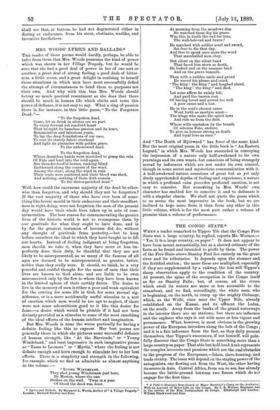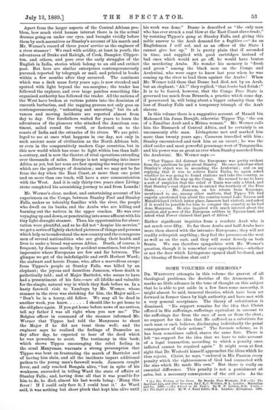THE CONGO STATE.*
WHEN a trader remarked to Tippoo Tib that the Congo Free State was a large country, he replied, reports Mr. Werner,— " Yes, it is a large country, on paper." It does not appear to have been meant sarcastically, but as a shrewd estimate of the facts as he found and intended to profit by them. The power of the Free State above Stanley Pool lies entirely on the great river and its tributaries. It depends upon the steamer and the fortified station ; the more these are multiplied, especially if they are supplemented by a railway, the less will Tippoo's sharp observation apply to the condition of the country. At present, the spine of the occupation is the Congo itself as far as Stanley Falls ; but, of course, all the rivers which swell its waters are more or less accessible to the steamboat, and we find, accordingly, the white man, who is beginning, on the north, to creep up the mighty Oubange, which, as the Welle, rises near the Upper Nile, already established on the Kassai, and its affluent the Lulua, on the south. Away from the banks of the grand waterways in the interior there are no stations; but there are influence and the explorer who rays it out with more or less vigour and permanence. What, however, is most obvious is the growing power of the European intruders along the belt of the Congo ; and it is a fair inference from the fact, as they daily present themselves, that Tippoo's successors, if not himself, will pain- fully discover that the Congo State is something more than a large countty on. paper. That able but half-bred Arab represents the complex interests and passions which are the real obstacles to the progress of the Europeans,—Islam, slave-hunting, and trade rivalry. The issue will depend on the staying power of the antagonists, one flowing out from the West, the other having its source in Asia. Central Africa, from sea to sea, has already become the battle-ground between two forces which do not engage for the first time.
• A Visit to Stanley's Rear-Guard at Major Barttolot's Camp on the Aruh ". With an Account of River-Life on the Congo. By T. R. Werner, Engineer, late in the service of the Etat Independant du Congo. Edinburgh and London William Blackwood and Sons.
Apart from the larger aspects of the Central African pro- blem, how much vivid human interest there is in the actual dramas going on under our eyes, and brought vividly before them by such narratives as Stanley's account of his march and Mr. Werner's record of three years' service as the engineer of a river steamer ! We read with avidity, at least in youth, the adventures of Drake and Raleigh, of Cook, Dampier, Clipper- ton, and others, and pore over the early straggles of the English in India, stories which belong to an old and extinct past. But here are similar enterprises contemporaneously pursued,-reported by telegraph or mail, and printed in books within a few months after they occurred. The continent which was a dark mass forty years ago, is now streaked and spotted with light beyond the sea-margins; the trader has followed the explorer, and over large patches something like organised authority has followed the trader. All the nations of the West have broken at various points into the dominion of uncouth barbarism, and the sapping process not only goes on contemporaneously, " unhasting and tuiresting," but its ad- vances and moving incidents are reported almost from day to day. Our forefathers waited for years to learn the adventures of the pioneers who attacked the American con- tinent, sailed round the world, or fastened on to the coasts of India and the estuaries of its rivers. We are privi- leged to see at once what happens in our day, not only in such ancient seats of civilisation as the North African belt, -or even in the comparatively modern Cape countries, but in this new world which has come to light within less than 1mil- a-century, and is now the theatre of rival operations extending over thousands of miles. Europe is not migrating into inner Africa as yet, but her sons are fast opening the watery avenues which are the pathways of dominion ; and we may not be far from the day when the East Coast, at more than one point and on more than one track, will have a sure communication with the West. And it is only thirty-two years since Living- stone completed his astonishing journey to and from Loanda!
Mr. Werner's clear, modest, and entertaining account of his experiences on the Congo, between Stanley Pool and Stanley Falls, makes us tolerably familiar with the river, the people who dwell on its banks, and the Arabs who are killing and burning out the natives in the upper reaches. He was ever voyaging up and down, or penetrating into some affluent with his tiny light-draught steamer. Thus, his opportunities for obser- vation were plentiful, and as he did not" despise his mercies," -we get a series of lightly sketched pictures of things and persons which help us to understand the new country and the courageous men of several nationalities who are giving their health and lives to make a broad way across Africa. Death, of course, is frequent, by disease mostly, by accident sometimes, but always impressive where Europeans are few and far between. The glimpse we get of the indefatigable and swift Herbert Ward; the stalwart and heroic Deane, who, after a marvellous escape from Tippoo's people at Stanley Falls, was killed by an elephant; the joyous and dauntless Jameson, whose death is pathetically told; and of Major Barttelot, who seems to have had a presentiment of his fate,—are all lifelike and valuable for the simple, natural way in which they flash before us. In a hasty farewell visit to Yambuya by Mr. Werner, whose steamer in the river was shrieking for him, the Major said,— " Don't be in a hurry, old fellow. We may all be dead in another week, you know I should like to get home to the old place again. If you get home before news of me arrives, tell my father I was all right when you saw me." The Belgian officer in command of the steamer informed Mr. Werner that Tippoo had told the Manyemas to shoot the Major if he did not treat them well; and the engineer says he realised the feelings of Damocles as, ,day after day, he expected to hear of the deed which he was powerless to avert. The testimony in this book, which shows Tippoo encouraging the rebel feeling in the cruel Manyemas, warrants a strong presumption that Tippoo was bent on frustrating the march of Barttelot and of having him slain, and all the incidents impart additional pathos to the young man's farewell words. Jameson caught fever, and only reached Bangala, alive, "but in spite of his weakness, succeeded in telling Ward the state of affairs at Stanley Falls; and, having done all that it was possible for him to do, he died, almost his last words being: Hang this fever! If I could only face it, I could beat it.' As Ward said, it was nothing but sheer pluck that kept him alive until his work was done." Deane is described as "the only man who has ever struck a real blow at the East Coast slave-trade," by resisting lippoo's gang at Stanley Falls, and giving this noble answer to the Arab demand for a fugitive :—" As an Englishman / will not, and as an officer of the State I
cannot give her up." It is pretty plain that if seconded in time, and supplied with good cartridges instead of bad ones which would not go off, he would have beaten the murdering Arabs. No wonder his memory is "fresh and green" among the black men on the Congo and Aruhwimi, who were eager to know last year when he was coming up the river to lead them against the Arabs ! When
Mr. Werner told them that Deane had died, not by an Arab, but an elephant, " Ah !" they replied, "that tembo had fetish!"
It is to be feared, however, that the Congo Free State is governed too much from Brussels, a practice which some day, if persevered in, will bring about a bigger calamity than the loss of Stanley Falls and a temporary triumph of the Arab slavers.
In this volume there is a suggestive account of }Iambi bin Mahomed bin Juma Borajib, otherwise Tippoo Tip, "the son of a Zanzibar Arab and a Mrima woman." Mr. Werner calls him the Bismarck of Central Africa, and he certainly is an uncommonly able man. Livingstone met and marked him more than twenty years ago ; Cameron travelled with him; Stanley encountered and took him as an escort; he was the chief raider and most powerful personage west of Tanganyika, and his power was as great as ever when Stanley marched from the Arahwimi. Mr. Werner says :—
" That Tippoo did distrust the Europeans was pretty evident from the questions he put about Stanley. He once asked me what Stanley's object was in ascending the Aruhwimi ; and on my replying that it was to relieve Emin Pasha, he again asked whether he was going to found stations and take the country, as he had done all the way up the Congo. He seemed to me to have a sort of suspicion that the relief of Emin was only a blind, and that Stanley's real object was to extend the territory of tho Free
State Mr. Jameson, on his return from Kassongo, mentioned to me, among other matters, that Tippoo Tit) had eagerly questioned him about the country round Lake Nyassa and Matabeleland (which latter place Jameson had visited), and asked if it would be possible for him to conquer the country as he had done Manyema. He also inquired with much interest about the position and power of the European settlers in Nyassa-land, and asked what Power claimed that part of Africa."
Rather significant inquiries from a resolute Arab who is not much over fifty. So far these Arabs and half-Arabs have more than shared with the intrusive Europeans; they will not readily relinquish anything; they feel the pressure on the west as well as on the east, and they will resist fiercely on both fronts. We can therefore sympathise with Mr. Werner's question, though it is somewhat over-apprehensive,—whether or not the door which Livingstone opened shall be closed, and
the blessing of freedom shut out P



































 Previous page
Previous page